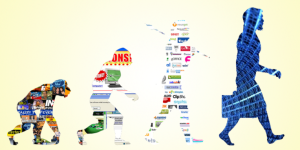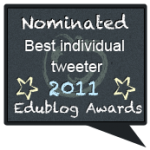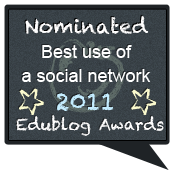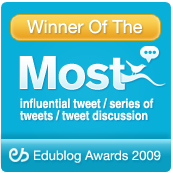
If there is one thing that I am sure of as an educator it is that rapid change greatly affects both what and how we learn. If there is a second thing that I am sure of as an educator it is that the evolution of technology is the driver of rapid change throughout our culture. Both of these factors in education and our culture lead me to question if teachers are being properly prepared to teach students whose learning is affected by so many different influences? The past learning experiences of educators are so different from the current and evolving experiences of their students that relevance as an educator is extremely important. Do today’s teachers understand the learning needs of today’s students?
A generational gap is a world of difference in terms of technology. For this reason I feel that many educators are products of a 20th century education that limits them as educators in the 21st century. Of course there are educators who have continually, professionally developed to stay relevant, but maybe not in enough numbers to make a great difference.
In the 20th century information was for the most part slower to change and often controlled by a small group of power brokers. News came from newspapers and magazines that were limited to publishing cycles and editors. The media was dominated by three networks which were limited by news cycles and strict editorial boards. Censors were assigned to every entertainment show to regulate the perceived moral agenda. Encyclopedias took years to amend and edit with an additional year to physically publish and were limited in circulation by high costs to the general public. Most households had telephones, but not a private line for each household member. The challenges of rapid change were not yet in place even though the stage was being set.
The Vietnam War began to awaken changes in the way we viewed the news. Journalists used more media tools in their reporting. Photos and film began to be broadcast in the news cycle, which was at a family-gathered dinnertime for most Americans. Students were moved by what they saw and many began to demonstrate against the government in numbers never before seen. These demonstrations then became media news as well, which exacerbated the anti-war movement. It took years of this to bring the war to an end, even with the help of the existing technology, which was controlled by forces heavily influenced by the government.
This was the way it was until the introduction of cable for more choice in entertainment and 24 hour news reporting. Gaming came along with Pong and later Donkey Kong, followed by The Oregon Trail. Calculators became portable and electronic. Life was good and teaching was pretty much focused on lecture and direct instruction because that was how it was always done. It worked because that was all we knew. The teacher stood in the front and students sat in rows.
The Internet was about to take a wrecking ball to that whole mindset prevalent in that century in that world.
Now we arrive in the 21st century with all of its technological advances. The Internet provides access to most of information ever to be established in the world. It provides access to entertainment that is often uncensored and unfiltered. Smartphones, which are not really phones, but powerful computers with phone capabilities. People have 24-hour connectivity to any person or source for the purpose of collaboration, curation, or simple communication. Computer-generated games that are realistic and intelligent, that may be played collaboratively and simultaneously with people around the world.
What does all of this have to do with our students today is the question that we need to address. Students today have grown up after all of these changes have taken place. Their world is different than many of their educators. It is also continuing to evolve even at a faster pace than ever before experienced and it will continue that way into the future.
Today’s students have grown up immersed in technology. They have had access to computers their entire lives. Their smartphones have more power than the computers that were used to put a man on the moon. Students are entertained by shows that they can select from literally hundreds of choices, most uncensored. Their news exposure is 24 hours a day from many sources. They can follow blogs that speak to their interests. They have mastered social media. They are comfortable collaborating with others. They are comfortable creating their own information in the form of text, music, audio, or video. The most important part of this is that their computer is their publisher. They need no adult permission to publish whatever they want to a waiting world on the Internet. They accept failure in games as a challenge to overcome in order to win. They can access any information at anytime to question any facts adults may throw at them. The most important point here is that they can also learn in spite of an irrelevant educator. Information once controlled by academia is now free and easily accessed.
Educators should view these technology skills as assets to be supported and enhanced. Critical thinking should be a key to accessing the valid and valued information needed. Collaborative learning should be the focus before lecture and direct instruction. Students who have great choices in their everyday lives should have more of a say in their own learning. Student voice is essential for students to own their learning. Mentoring students in using their technology skills to curate, communicate, and create content is a more effective way to learn than to simply consume teacher-selected content.
Educators need to understand that they are teaching kids to live in a world that is not yet here. We are not slow to change any longer. Developing students who are flexible and willing to continually learn is the best we can do to insure their future. Teaching kids how to learn is more important than to teach them what to learn. They will find on their own what it is that they personally need to learn. Preparation for that point in time is what we need to teach them.
As I watch these students from Parkland, Florida, I am more convinced that this is the way we must teach. These kids are not “Actors” as some suggest. They are articulate, intelligent, technology savvy students who have a need to learn, create, collaborate, and communicate. They do it so well; it causes 20th century thinkers to question their validity. They are real, and now have a cause and a purpose with the skills to present it to their country.
I am not saying that all teachers are not doing their best to teach. I believe that most are doing their very best. I also believe that in a world where change is so rapid, the tools that educators have been prepared with may no longer serve that purpose. We need to continually train educators more than one or two days in a year. Irrelevant teachers are the fault of the districts in which they work. If we are to better educate our kids, we must first better educate their educators.
 I recently attended FETC, which is considered to be an annual, premiere, national education conference. The vendor floor consisted of hundreds of companies hawking their wares to an audience of educators, many of whom are recipients of an education that was limited in its exposure to the advantages of today’s technology. That will probably always be true of educators, when we consider the rapid rate of change that occurs in technology on an ongoing basis. Educators will always have new and different technologies available in their teaching that were not available in their own education. That combined with the fact that most people are not comfortable with change in general makes it difficult to affect change in an institution, which is considered by many to be on a conservative path, and slow to change. Many of the philosophies, priorities, systems, beliefs, and methods in education date back centuries. Change is hard even when we see the need for it.
I recently attended FETC, which is considered to be an annual, premiere, national education conference. The vendor floor consisted of hundreds of companies hawking their wares to an audience of educators, many of whom are recipients of an education that was limited in its exposure to the advantages of today’s technology. That will probably always be true of educators, when we consider the rapid rate of change that occurs in technology on an ongoing basis. Educators will always have new and different technologies available in their teaching that were not available in their own education. That combined with the fact that most people are not comfortable with change in general makes it difficult to affect change in an institution, which is considered by many to be on a conservative path, and slow to change. Many of the philosophies, priorities, systems, beliefs, and methods in education date back centuries. Change is hard even when we see the need for it.










